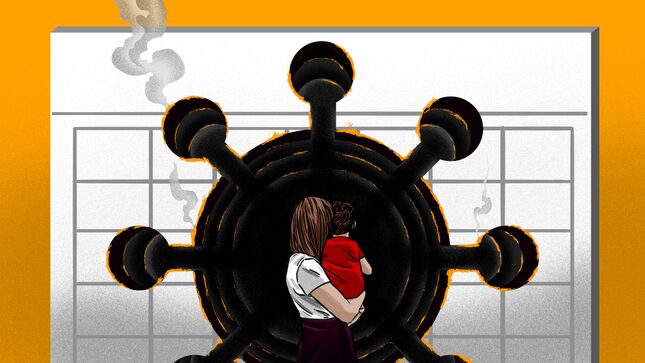The Long Haul Symptoms of Being a Covid-Era Mom
Male pundits urge us to "go back to normal," but those of us who've endured the grief and isolation of new motherhood during the pandemic know better.
In Depth
Illustration: Benjamin Currie
Increasingly, I’ve found myself enraged by the White Man With A Newsletter pundit set using their somehow immense platform to tell the world that because I am doing everything in my power to protect my 17-month-old from being exposed to a virus that could kill him, I am a paranoid ideologue who rejects science and reason. These Davids, Jonathans, and Alecs fundamentally predicate their arguments on the notion that I can and should “go back to normal” and “move on” with my life because, I, individually, am vaccinated, so the risk of “normalcy” turning fatal for me, specifically, is low. In the process, they have rendered invisible the children under five, the immunocompromised, the vulnerable, and the people who love anyone within those categories.
As someone who reported on Congress and politics for almost a decade, I already was cynical about the state of our country, aware that death could be our politics’ collateral damage and fearful that a national media built on a “both-sides” ethos of coverage would not hold a breaking government to account. The 22-year-old Meredith who moved to Washington with high ideals of public service had faded away long before the pandemic hit. But the person who emerged to replace her was not fully actualized by the time I decided to be a mother, or later, when I had to sequester my physical self in my apartment while sitting largely alone with my emotional self. I could not have imagined the despair I would feel at our nation’s collective shrug as it hurtles toward a million deaths as a result of a pandemic we, as a society, have quit trying to contain. For as much as the “move on” pundits question the thinking of people like me, it’s hard for me to understand how—looking at the same set of facts—they can magically flip a switch and be who they were before. Must be nice.
These “go back to normal” proponents, because of their media influence, have undue power over the narrative of how Americans feel about the pandemic—which in turn has influenced politicians across the country to ease back protections based on a vague sense that “people are done,” and in defiance of both public health data and polls stating the majority of their constituents support safety rules. More than that, though, these talking heads also represent a growing sect of privileged people, people we see and know in our everyday lives, who have no pressing need to adjust their behaviors, are unwilling to make even the smallest concessions for the greater good, and cannot understand why every other person on earth does not want to join them in the freedom they already have but purport to be missing.
They want to return to a time when there never was a pandemic, because to return to that unreachable place is to enjoy their freedom without guilt, to avoid grappling with how many lives have been lost or changed, and to never consider how their words might have played a role in incalculable loss. They are moving forward without looking back. The rest of us are stuck.
It feels like I’m treading water in an ocean where one current is the futility of our collapsing society and the cross-current is my desire to figure out who I am supposed to become, and the thing I’m holding up above the surface is a baby—whose birth was one of the most profound acts of hopefulness of my life—just so he can feel the sun. There is no old “normal” left for me. These past two years have changed me forever, and I cannot go back to a person who is gone in a time that does not exist.
My initial views of pandemic pregnancy and new parenting were significantly shaped by the fact that in the closing months of The Beforetimes in 2019, I lost our first son in my twenty-second week of pregnancy—a traumatic loss for which doctors could not ascribe a medical explanation, and a statistical anomaly of which I only had a .5 percent chance of facing. Missed baby showers, going to scans alone, even the prospect of laboring and delivering alone when we imagined that in Spring 2020—none of these sadnesses or fears resonated with me, when in my view, pregnancy had been flattened into a neat binary: Do I get to take a healthy baby home or not? This binary focused me. It gave me purpose. It also made me theoretically willing to sacrifice the things that I considered “nice to have,” so that no other woman would face additional odds. Every medical professional who treated me treated other pregnant women, so limiting covid exposure for them, attending appointments alone, pondering delivery alone, meant doing my small part to cut the chances of anyone having to lose something precious like we had.
-

-

-

-

-

-

-

-

-

-

-

-

-

-

-

-

-

-

-

-

-

-

-

-

-

-

-

-

-

-

-

-

-

-

-

-

-

-

-

-








































